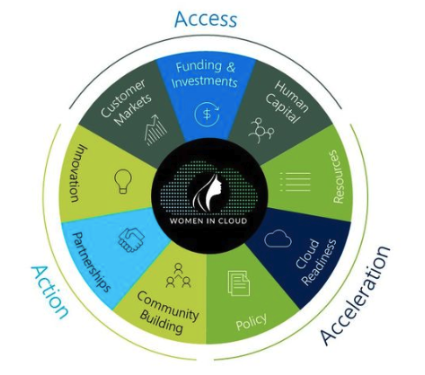In spite of recent gains by women entrepreneurs and an increasingly diverse community of tech founders, gender parity in this sector is still far from a reality. As an example, less than 3% of VC investments are dedicated to female tech entrepreneurs. Combine this ongoing shortfall with severe economic fallouts resulting from COVID-19 (and anticipated in the coming months), and there is serious danger of progress towards equity being reversed.

In moments like this, women-led organizations working directly with this group can provide unique insight and solutions. Women in Cloud is a community-led economic development initiative dedicated to helping female tech entrepreneurs gain $1 billion in economic access by 2030 through partnerships within the public and private sector. The organization is working to meet this goal through community-building, a cloud accelerator, and public policy advancement.
What Women in Cloud did
In partnership with Founders Live, M12 – Microsoft’s Venture Fund, IAMCP, UN EQUALS, and Microsoft Alumni Network, Women in Cloud created a COVID-19 impact survey for women tech entrepreneurs. The survey focuses on business and personal impacts, both estimated and current, related to coronavirus, as well as data related to economic access and policy.
Women in Cloud has also launched a COVID-19 query form to help the organization identify needs and share resources with their community.
How they did it
Women in Cloud aimed to be strategic in their response to COVID-19 in order to ensure the most impactful outcome. According to Chaitra Vedullapalli, president & co-founder of Women in Cloud, it was important to pause and assess the situation surrounding coronavirus rather than immediately add to the noise.
“Instead of trying to go and put on more events and more activities,” Vedullapalli says, “Women in Cloud actually took a step back. We asked, what can we do to identify the risk of not doing anything? How can we prevent this from happening again? How can we identify new policies that can help advance companies, especially women-led companies? So that’s how we created our survey form.”
With the information they collect from the impact survey, Women in Cloud will be creating a report aimed at promoting policy and supporting the creation of emergency funding and programs.
“How can we become a solution, Vedullapalli asks, “a solution in the plan for building the new economy, the new society, so that women entrepreneurs have equal access to contribution? That is the outcome we are looking for.”
Using their COVID-19 query form, leadership at Women in Cloud hopes to keep women entrepreneurs in tech equipped with the up-to-date resources they need.
As Vedullapalli shares, “We are collecting inquiries from our community, to really develop and enable a resource center that allows people to get timely solutions. What we want to do is collect the information, the what, the how, the who—and make sure it’s very clear so entrepreneurs can take action.”
Vedullapalli offers the Small Business Administration’s Payback Protection Program as an example of a time when the Women in Cloud community didn’t have the information and tools they needed to respond quickly enough.
“When you go through this kind of chaos and challenge,” she asks, “how do you help entrepreneurs to have a really structured way to manage their engagement with the government as a corporation so that they’re prepared for recovery?”
As a community-led and community-driving organization, the leadership at Women in Cloud advises directing attention on the full range of constituents affected by COVID-19.
As Vedullapalli observes, “In this moment, companies should move from serving shareholders to serving stakeholders who are customers, partners, vendors, employees—so everybody’s taken care of through this journey. It’s a time to stop selling, and start helping.”

Women in Cloud’s three pillar strategy
What’s next
Women in Cloud is still actively seeking responses to its query form and survey, the latter requiring only fifteen minutes to complete. The resulting report is aimed at deterring present and future economic loss related to coronavirus, as well as aiding women entrepreneurs overall in attaining success.
“Submittable is our go-to platform for collecting data,” Vedullapalli says, “so we decided to use it for COVID-19. The more results we can get for the impact report, it’s going to make it that much more valuable when we present it to policy makers and address how to create change.”
Learn about how Submittable can help your organization respond to COVID-19. If you’re interested in tips for collecting data related to coronavirus, here are more ideas and video interview with AIR.

